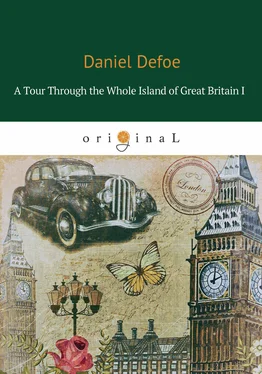N. B. This Ralph Randolph, or Ralph Peverell (call him as you please) had, it seems, a most beautiful lady to his wife, who was daughter of Ingelrick, one of Edward the Confessor’s noblemen: He had two sons by her, William Peverell, a fam’d soldier, and Lord or Governor of Dover Castle; which he surrender’d to William the Conqueror, after the Battle of Sussex; and Pain Peverell, his youngest, who was Lord of Cambridge: When the eldest son delivered up the castle, the lady his mother, above nam’d, who was the celebrated beauty of the age, was it seems there; and the Conqueror fell in love with her, and whether by force, or by consent, took her away, and she became his mistress, or what else you please to call it: By her he had a son, who was call’d William, after the Conqueror’s Christian name, but retain’d the name of Peverell, and was afterwards created by the Conqueror, Lord of Nottingham.
This lady afterwards, as is supposed, by way of penance, for her yielding to the Conqueror, founded a nunnery at the village of Hatfield-Peverell, mentioned above, and there she lies buried in the chapel of it, which is now the parish-church, where her memory is preserv’d by a tomb-stone under one of the windows.
Thus we have several towns, where any antient parks have been plac’d, call’d by the name of Hatfield on that very account.
As Hatfield Broad Oak in this county, Bishop’s Hatfield in Hertfordshire, and several others.
But I return to King Edward’s merry way, as I call it, of granting this forest to this Ralph Peperking, which I find in the antient records, in the very words it was pass’d in, as follows: Take my explanations with it, for the sake of those that are not us’d to the antient English.


He might call such other witnesses to sign as he thought fit.
Also the king’s high steward was a witness, at whose request this Grant was obtained of the king.
There are many gentlemen’s seats on this side the county, and a great assemblee set up at New-Hall, near this town, much resorted to by the neighbouring gentry. I shall next proceed to the county of Suffolk, as my first design directed me to do.
From Harwich therefore, having a mind to view the harbour, I sent my horses round by Maningtree, where there is a timber bridge over the Stour, called Cataway Bridge, and took a boat up the River Orwell, for Ipswich; a traveller will hardly understand me, especially a seaman, when I speak of the River Stour and the River Orwell at Harwich, for they know them by no other names than those of Maningtre-Water, and Ipswich-Water; so while I am on salt water, I must speak as those who use the sea may understand me, and when I am up in the country among the in-land towns again, I shall call them out of their names no more.
It is twelve miles from Harwich up the water to Ipswich: Before I come to the town, I must say something of it, because speaking of the river requires it: In former times, that is to say, since the writer of this remembers the place very well, and particularly just before the late Dutch Wars, Ipswich was a town of very good business; particularly it was the greatest: town in England for large colliers or coal-ships, employed between New Castle and London: Also they built the biggest: ships and the best, for the said fetching of coals of any that were employed in that trade: They built also there so prodigious strong, that it was an ordinary thing for an Ipswich collier, if no disaster happened to him, to reign (as seamen call it) forty or fifty years, and more.
In the town of Ipswich the masters of these ships generally dwelt, and there were, as they then told me, above a hundred sail of them, belonging to the town at one time, the least of which carried fifteen-score, as they compute it, that is, 300 chaldron of coals; this was about the year 1668 (when I first knew the place). This made the town be at that time so populous, for those masters, as they had good ships at sea, so they had large families, who liv’d plentifully, and in very good houses in the town, and several streets were chiefly inhabited by such.
The loss or decay of this trade, accounts for the present pretended decay of the town of Ipswich, of which I shall speak more presently: The ships wore out, the masters died off, the trade took a new turn; Dutch fly boats taken in the war, and made free ships by Act of Parliament, thrust themselves into the coal-trade for the interest of the captors, such as the Yarmouth and London merchants, and others; and the Ipswich men dropt gradually out of it, being discouraged by those Dutch flyboats: These Dutch vessels which cost nothing but the caption, were bought cheap, carried great burthens, and the Ipswich building fell off for want of price, and so the trade decay’d, and the town with it; I believe this will be own’d for the true beginning of their decay, if I must allow it to be call’d a decay.
But to return to my passage up the river. In the winter time those great collier-ships, abovemention’d, are always laid up, as they call it: That is to say, the coal trade abates at London, the citizens are generally furnish’d, their stores taken in, and the demand is over; so that the great ships, the northern seas and coast being also dangerous, the nights long, and the voyage hazardous, go to sea no more, but lie by, the ships are unrigg’d, the sails, &c. carry’d a shore, the top-masts struck, and they ride moor’d in the river, under the advantages and security of sound ground, and a high woody shore, where they lie as safe as in a wet dock; and it was a very agreeable sight to see, perhaps two hundred sail of ships, of all sizes lye in that posture every winter: All this while, which was usually from Michaelmas to Lady Day, The masters liv’d calm and secure with their families in Ipswich; and enjoying plentifully, what in the summer they got laboriously at sea, and this made the town of Ipswich very populous in the winter; for as the masters, so most of the men, especially their mates, boatswains, carpenters, &c. were of the same place, and liv’d in their proportions, just as the masters did; so that in the winter there might be perhaps a thousand men in the town more than in the summer, and perhaps a greater number.
To justify what I advance here, that this town was formerly very full of people, I ask leave to refer to the account of Mr. Camden, and what it was in his time, his words are these.
«Ipswich has a commodious harbour, has been fortified with a ditch and rampart, has a great trade, and is very populous; being adorned with fourteen churches, and large private buildings».
This confirms what I have mentioned of the former state of this town; but the present state is my proper work; I therefore return to my voyage up the river.
The sight of these ships thus laid up in the river, as I have said, was very agreeable to me in my passage from Harwich, about five and thirty years before the present journey; and it was in its proportion equally melancholly to hear, that there were now scarce 40 sail of good colliers that belonged to the whole town.
In a creek in this river call’d Lavington-Creek we saw at low water, such shoals, or hills rather, of muscles that great boats might have loaded with them, and no miss have been made of them. Near this creek Sir Samuel Barnadiston had a very fine seat, as also a decoy for wild ducks, and a very noble estate; but it is divided into many branches since the death of the antient possessor; but I proceed to the town, which is the first in the county of Suffolk of any note this way.
Читать дальше














